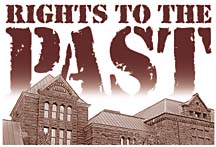
 |
Groups inspect
sacred burial cave
Investigators do not say what
was found on the Big Island
KOHALA >» Federal and state investigators in the company of native Hawaiians and their private investigator entered a burial cave on the Big Island Friday to take stock of Hawaiian artifacts that may be missing and for sale on the black market.
"I'm not at liberty to say what we found. We found what we expected," said Donald Wong, chief investigator for the attorney general's office.
In separate investigations, the state and agents with the federal Interior Department have been looking into how valuable artifacts from Kanupa cave, items from the well-known "Emerson Collection" which once were held by the Bishop Museum and the Peabody Essex Museum in Salem, Mass., have allegedly shown up for sale on the antiques black market within the last year.
Wong confirmed that state and federal investigators along with members representing native Hawaiian groups who are claimants to the cave, the Dept. of Land and Natural Resources and the Big Island Burial Council were present when the cave was opened Friday.
"The federal government is the lead agency with this particular situation. Depending upon what is discovered (in the cave and on the black market) the attorney general may become involved," Wong told the Star-Bulletin as he stood rubbing his head with ice cubes under the hot sun. His forearms and clothes were rubbed with red dirt, presumably from the cave.
Federal investigators initiated the investigation at least as far back as last spring. The state attorney general's office opened its investigation after a picture of the unsealed cave appeared in the Star-Bulletin in August. The native Hawaiian group, Hui Malama I Na Kupuna O Hawaii, which reburied the items in the cave in November 2003, pushed the state to seal the entrance and investigate.
Richard Bisson, the first deputy attorney general, and not the head of criminal investigations, has been put in charge of the state investigation. Depending on the findings, state and federal prosecutors will decide based on evidence and legal jurisdiction who prosecutes what crimes, if any.
Sources close to both investigations say the state is not interested in pursuing an investigation.
Hui Malama is a native Hawaiian organization founded in 1989 that has been aggressively and sometimes controversially at the forefront of repatriating and reburying ancestral remains, sacred objects and burial items from museums around the world.
Eddie Halealoha Ayau, a spokesman for Hui Malama, worked with federal and state investigators Friday to unseal the cave to determine if items Hui Malama reburied are missing.
Ayau and federal investigators declined comment as they climbed down the hill from the cave Friday.
Ayau was accompanied by Terry Pennington of the private investigation firm Goodenow Associates, the firm that worked with the attorney general's office during the investigation several years ago of the trustees of Kamehameha Schools.
After the inspection Friday, the group poured cement over a fortification of metal rebar to secure the cave opening.
The opening of Kanupa cave has raised questions about security at other caves, such as Kawaihae or Forbes Cave, where priceless Hawaiian artifacts have been reburied. Ayau and his group have repeatedly said that their word must be taken that the artifacts were reburied.
The Star-Bulletin, which had permission from the land's tenant, was not allowed by Wong onto the state-owned land where Kanupa cave lies to determine what was found, saying it was the scene of "an ongoing criminal investigation, which had certain cultural sensitivities."
Late Thursday, Ayau and others came before a meeting of the Big Island Burial Council in Kailua-Kona to ask permission to enter Kanupa cave with federal and state investigators to inventory what may have been taken.
Ayau's presentation to the burial council was closed to the public, mostly upon his request, on grounds that it discussed the location of a burial cave and that it was an ongoing criminal investigation.
The council voted unanimously to allow investigators to enter the cave.
"We asked (the burial council) because it was the politically right thing to do," said one investigator.
huimalama.tripod.com
Bishop Museum
www.bishopmuseum.org
U.S. Interior Dept. -NAGPRA
www.cr.nps.gov/nagpra